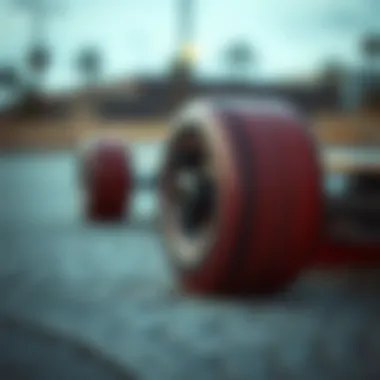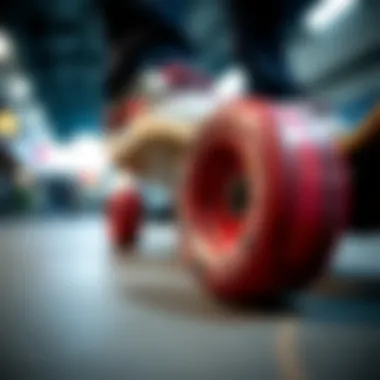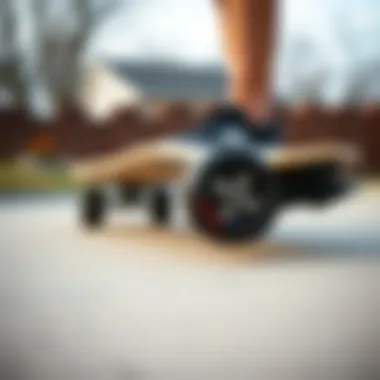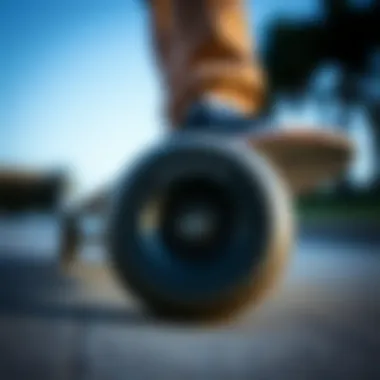Understanding Skateboard Wheels with 78A Durometer


Intro
Skateboarding, as a vibrant and dynamic sport, has evolved remarkably over the years. Among the myriad of components that contribute to a skateboard's performance, wheels play a pivotal role. In this guide, we will delve into skateboard wheels with a durometer rating of 78A. This softer hardness level offers a distinct balance of grip and comfort, making it an ideal choice for riders navigating varied terrain.
Understanding the specific characteristics of 78A wheels opens doors to better riding experiences. Whether you are cruising down a sidewalk or performing tricks at a skatepark, the choice of wheels significantly impacts your performance. We will traverse the practical aspects of these wheels, from the materials that make them up to the factors influencing their suitability across different skating styles.
We aim to equip skateboarders, coaches, and parents with the insights they need to enhance their understanding of wheel dynamics and maintenance practices. This knowledge can ultimately improve performance and enjoyment in skateboarding, regardless of skill level.
Prelims to Skateboard Wheels
Skateboarding enthusiasts often underestimate the critical role wheels play in shaping the overall skating experience. The right choice in wheels can mean the difference between a smooth glide and a bumpy ride. Skateboard wheels come in various styles, sizes, and hardness ratings, each tailored for specific skating environments and rider preferences. Understanding these wheels is fundamental not only to performance but also to safety and comfort on the board.
Overview of Skateboard Wheel Types
Skateboard wheels can be categorized mainly into three types: street wheels, park wheels, and cruiser wheels.
- Street Wheels: These wheels are typically harder, with durometers ranging from 99A to 101A. They are designed for tricks, grinds, and other street maneuvers, providing a quick, responsive feel.
- Park Wheels: Generally softer than street wheels, park wheels fall within the 83A to 97A range. This increased softness offers more grip during transitions and helps absorb shocks on uneven surfaces.
- Cruiser Wheels: These are often the softest, around 78A to 83A, and are perfect for casual riding and commuting. They provide a smooth ride even over bumps and cracks.
Each type serves its unique purpose, and knowing the differences can help a skater select the appropriate wheels for their style and riding terrain.
The Importance of Wheel Hardness
The hardness of skateboard wheels, measured in durometer, is crucial. It affects how wheels grip surfaces, how they absorb shock, and even how they roll on various terrains.
For instance, the 78A hardness rating indicates a soft wheel. This softness contributes to several benefits, especially for beginner skaters or those navigating rough terrains.
- Grip: Softer wheels offer better traction, which can enhance stability. It allows riders to feel more secure during turns and tricks.
- Shock Absorption: The softness helps cushion the rider from bumps and irregularities in the pavement, reducing the likelihood of jarring impacts.
- Ease of Ride: Beginners often find softer wheels easier to control as they slow down quicker and are generally more forgiving when it comes to balance.
In summary, understanding skateboard wheels, especially their types and hardness, is fundamental to creating a better skating experience. This knowledge empowers skaters to make informed decisions, whether they are just starting or are seasoned veterans looking to refine their setups.
Understanding Durometer Ratings
Understanding durometer ratings is a crucial aspect when diving into the world of skateboard wheels, especially if you're considering the 78A rating. Durometers measure the hardness of the wheel, which in turn affects how they perform under various conditions. Skateboard wheels come in a variety of hardness levels, typically ranging from soft to hard, and this hardness is measured using the durometer scale. The right durometer rating can influence grip, speed, durability, and comfort, making it a pivotal factor for skaters of all skill levels.
Explaining the Durometer Scale
The durometer scale is a way to quantify the hardness of materials, particularly rubberized substances like skateboard wheels. This scale, usually represented by a scale of 1 to 100, helps you understand how stiff or soft a wheel is. The higher the number, the harder the wheel. While you might find a common rule of thumb in skateboarding, lower durometer ratings—like the 78A wheels—tend to offer a softer feel, resulting in better grip and shock absorption on rough surfaces.
Different methods can be used to measure hardness, but the most popular in the skateboard realm is the Shore A scale. When you come across a 78A wheel, it indicates a moderate softness that provides a balance between speed and control. For riders who spend time on unconventional terrains, this scale becomes the compass guiding their choice to maximize their experience.
How 78A Fits into the Durometer Spectrum
Within the realm of skateboard wheels, the 78A rating sits comfortably in the softer end of the durometer spectrum. Here’s a breakdown of how it compares:
- Softness Category: Wheels rated 78A and below are typically classified as soft wheels. This means greater grip and easier handling on rough surfaces.
- Concrete vs. Wood: When skating on concrete or other rugged surfaces, 78A provides a cushioned ride that absorbs shocks effectively, leading to a more pleasant experience. In comparison, harder wheels can feel like riding on bricks.
- Versatility of Use: The 78A wheels are preferred for cruising and park skating but might not excel as much in speed for competitive races or skate parks where precision is key.
In a nutshell, while a 78A rating might not be the go-to for skaters wanting to hit high speeds on perfectly manicured surfaces, it excels in providing comfort and grip in less-than-ideal conditions. The choice of wheel hardness shapes a skater's style and can dramatically influence performance. Thus, understanding where 78A falls in the durometer spectrum equips skaters with valuable insights as they refine their skating experience.
In summary, selecting skateboard wheels with an appropriate durometer rating allows skaters to enhance their ride, consider their unique environment, and ultimately enjoy their skating to its fullest potential.


The Characteristics of 78A Wheels
When we talk about skateboard wheels, understanding their characteristics is essential to getting the most out of your skating experience. 78A wheels hold a unique position on the durometer scale, appealing to a range of riders. The importance of these wheels largely stems from their soft composition, which provides several benefits when considering different skating styles and conditions.
Material Composition
The material composition of 78A wheels is primarily urethane, which offers a blend of durability and grip. Urethane's elasticity allows the wheels to absorb shocks effectively, making them ideal for cruising over rough surfaces. This material not only enhances the comfort while riding but also extends the life of the wheels due to its wear-resistant properties. As you roll over bumpy terrain or feel the vibrations of the street, these wheels help maintain a smoother ride.
A crucial point to mention about these wheels is how they perform under different conditions. Urethane wheels like those rated at 78A are favored for street skating since they grip the surface more securely compared to harder wheels. This grip translates into better control, which is key for executing tricks and navigating various terrains.
Performance in Different Environments
Street Skating
In the world of street skating, 78A wheels shine when it comes to maneuverability and comfort. Riders often prefer these softer wheels because they offer better traction on uneven surfaces such as sidewalks or parking lots. The grip they provide is a significant advantage, especially when accelerating or taking sharp turns.
Another aspect to consider is the noise level. Softer wheels tend to produce less noise compared to hard wheels, making them ideal for urban environments where skaters might want to keep a low profile. However, the downside is that they don't slide as easily, which can be a disadvantage for those looking to perform sliding tricks.
Park Skating
Park skating presents a mixed bag for 78A wheels. In skate parks, where surfaces tend to be smoother, the wheels can offer a different experience. They provide adequate grip on ramps, and their shock-absorbing nature helps during landings from heights. Many riders report that they enjoy the added stability for tricks when using 78A wheels in this environment.
On the flip side, the softness can slow down roll speed on smoother surfaces compared to harder wheels, which can be a drawback during high-speed runs. Park skaters must weigh the comfort of landing tricks versus the need for speed.
Vert Skating
For vert skating, 78A wheels find their place in providing control and grip during massive airs and transitions. The softness of these wheels assists in catching landings, which is crucial when coming down from high heights. Riders transitioning from ramp to ramp often rely on the cushioning that 78A wheels offer.
However, vert skaters need to be mindful of the slower roll speed. The performance might not match that of harder wheels, especially when it’s time to gain momentum to ascend the vert walls. Thus, while they absorb shocks well, they might require a bit more effort to achieve the necessary speed for high-impact tricks.
In summary, choosing 78A wheels can lead to enhanced comfort and control across different skating environments. The material composition and specific characteristics of these wheels cater well to various skating styles, making them a popular choice among both beginners and seasoned skaters.
"The right wheels can make all the difference in your skating experience. Selecting 78A can improve comfort and grip, especially on uneven surfaces."
This keen understanding of 78A wheels and their characteristics helps riders effectively select wheels that complement their individual skating style and the environments in which they ride.
Ideal Skaters for 78A Wheels
When it comes to skateboarding, finding the right wheels is akin to searching for a soulmate—you really have to look for that perfect match. In the case of 78A wheels, they're particularly well-suited for a certain range of skaters. Understanding who benefits the most from these wheels helps in making the right choice that enhances performance and enjoyment on the board.
Skill Level Suitability
The first thing to consider is the skill level of the skater. 78A wheels are soft, allowing them to absorb some of the shocks from cracks and bumps found on the streets. This is a significant advantage for beginners learning the ropes. If you’re just stepping onto the board, these wheels provide a cushioned ride, which can minimize the chances of losing balance. More seasoned skaters who prefer cruising around the park or on smooth pathways also find them beneficial due to their grip and comfortable ride.
- Beginners: Perfect for those who are just starting out. They mitigate the stresses of learning.
- Intermediate Skaters: Ideal when practicing tricks or stunts, especially in parks where the ground is a bit rough but not too harsh.
- Advanced Skaters: While they may not offer the same level of control at high speeds as harder wheels, they can still be advantageous for those who favor smooth pavement and want a more relaxed feel during casual rides.
In essence, any skill level can find a benefit from these wheels. Rider comfort, stability, and reduced chance of injury make them a top pick for novices, while their performance nuances make them an interesting choice for seasoned boards.
Rider Preferences and Styles


Different skaters have varied preferences and styles, which further influences their choice of wheels. 78A wheels cater to those riders who lean towards a more laid-back style. If you enjoy street skating, carving around, and cruising at leisurely speeds, these wheels fit perfectly into your lifestyle.
Skaters who engage in more aggressive types of skating, like vert or high-impact tricks, may look for something with a harder durometer. However, if you value comfort and smoothness above all, then sticking with the 78A is likely your best bet.
Some factors to think about include:
- Skating Environment: If you regularly skate on rough surfaces, 78A wheels provide the cushioning needed for a fun ride.
- Preference for Speed vs. Control: If you like the feeling of glide over the ground without too much jarring feedback, the softness of these wheels will keep your skating smooth.
- Trick Style: Riders focusing on street skating may enjoy the grip that comes with softer wheels, enhancing their capability to perform tricks without losing balance.
In many ways, choosing the right wheel is not just a matter of performance but also about enjoying the ride itself. The softness of 78A can keep your skating experience pleasurable, regardless of the bumps along the path.
Choosing wheels is a nuanced task. Yet with an understanding of your skill level and skating style, the journey to finding the perfect 78A wheels becomes clear.
For further insights and discussions regarding wheels and their various uses, forums like reddit.com/r/skateboarding can be resourceful.
Maintenance and Care for 78A Wheels
In the world of skateboarding, the significance of proper maintenance and care for your 78A wheels can't be overstated. Just like any high-performance gear, your skateboard wheels require attention to ensure they perform optimally and last longer. Regular upkeep of your wheels not only enhances your riding experience but also contributes to your overall safety on the board. Rushing through a session on worn-out wheels can lead to mishaps, impacting both your confidence and your skills. A bit of diligence in maintenance keeps the ride smooth and the performance sharp.
Regular Cleaning Techniques
Keeping your 78A wheels clean is vital for their longevity and performance. Dirt and debris accumulate over time, affecting how well they grip and roll. Here are some straightforward yet effective methods to clean your wheels:
- Remove the Wheels: Start by taking the wheels off your skateboard. This makes it easier to clean them thoroughly.
- Use Warm, Soapy Water: Mix some warm water with mild soap. Avoid harsh chemicals that can degrade the wheel material.
- Scrub Gently: Use a soft brush or cloth to scrub the wheels. Pay extra attention to the crevices where dirt likes to hide.
- Rinse and Dry: Rinse them off properly under running water and then let them dry completely before reattaching.
- Check Bearings: While you're at it, clean out the bearings. A little bit of bearing oil goes a long way to ensure they spin smoothly.
Regular cleaning not only keeps your wheels looking fresh but also prevents issues like flat spots or uneven wear, which can make skating less enjoyable.
Identifying Wear and Tear
Understanding the signs of wear and tear on your 78A wheels is essential. Over time, wheels can become damaged due to the wear of the urethane and other contributing factors like riding surface. Here are some characteristics to look for when inspecting your wheels:
- Flat Spots: If you feel a bump or a rough patch when rolling, it’s a sign of flat spots on the wheel. They can severely affect your performance.
- Cracks or Chips: Inspect the surface for any cracks or chips. These can compromise the integrity of the wheel and impact your safety.
- Uneven Wear: Every wheel should wear evenly regardless of the surface used. If one side is worn more than the other, it is time to rotate or replace the wheels.
- Hardening: If your wheels feel significantly harder than when new, it’s an indication that they’ve aged and may not grip well anymore.
Regular checks for these signs can save you from nasty spills or a frustrating skate session.
"An ounce of prevention is worth a pound of cure."
Regular maintenance of your 78A wheels ensures they ride smoothly and last longer, improving both your comfort and safety on the skateboard.
By prioritizing maintenance, you're not only extending the life of your wheels but also enhancing your skating experience overall. Skaters, coaches, and enthusiasts alike will find that well-maintained 78A wheels can make a noticeable difference on the board.
Choosing the Right Wheels
Selecting the right wheels is crucial for any skateboarder aiming to enhance their riding experience. The wheel choice profoundly impacts how a skateboard performs across different terrains. For those riding on smoother surfaces, hard wheels might feel great, but for varied environments, softer wheels like those rated 78A are often preferred due to their ability to absorb shock and provide better grip. This guide helps skaters understand what to consider when picking their wheels and how those choices influence their skating style, safety, and enjoyment.
Assessing Your Skating Environment
Understanding your environment is the first step in choosing the right wheels. Skateboarding surfaces are varied, stretching from rough asphalt to smooth skatepark ramps. Below are aspects to consider:
- Surface Quality: Is the ground smooth or filled with cracks and bumps? Softer wheels, like 78A, are more forgiving on rough surfaces, providing a smoother ride.
- Location Type: Parks, streets, and bowl areas have different requirements. Park skating typically benefits from harder wheels that offer speed on ramps. Conversely, street skaters navigating rough sidewalks might find 78A wheels provide the comfort they need.
- Weather Conditions: Rain or wet surfaces can make any board feel precarious. Softer wheels grip better on slick surfaces, making them a safer choice during unexpected weather changes.
Considering these factors helps ensure you choose wheels that enhance performance and maintain safety, turning any ride into an enjoyable experience.


Wheel Size and Compatibility
Wheel size is another key component in this decision-making process. Various sizes are available, from smaller 50mm wheels to larger ones at 60mm and above. Here’s what to keep in mind:
- Board Type: Your skateboard deck’s width plays a role in wheel size compatibility. A wider board often pairs well with larger wheels for stability, while narrower decks might work better with smaller counterparts.
- Skating Style: Street skaters often opt for smaller wheels for agility, while ramp riders favor larger wheels for speed and momentum. If you’re using 78A wheels, matching the size to your needs can improve your ability to exploit those soft characteristics.
- Trucks and Clearance: Ensure the wheel size you choose aligns with your truck settings and deck height. Too large of a wheel can result in wheel bite, where the wheel contacts the deck during turns, causing a sudden stop and potential wipeout.
"Choosing the right wheels isn't just about smooth rides; it's about finding your balance and maximizing your skills."
Useful Links for Further Exploration
Evaluating your needs regarding environment and gear compatibility is essential for every skateboarder looking to refine their skills and enjoy the ride.
Upgrading and Mixing Wheels
Upgrading and mixing skateboard wheels can be a game changer for riders looking to refine their performance or enhance versatility. As skaters journey through their craft, they may find that their initial setup no longer meets their evolving needs. Upgrading to different wheels—whether changing the hardness, size, or even the material—can significantly affect one’s skating experience.
For those seeking to mix wheels, the idea might initially seem counterintuitive; after all, uniformity can often enhance control. But, experimenting with different combinations can yield surprisingly fulfilling results. Each type of wheel possesses unique properties that can influence ride quality and skill execution.
Exploring Wheel Combinations
Combining different wheels allows the rider to tailor their rig to specific skateboarding styles and personal preferences. Picture this: you’re a street skater who often tacks on some park time. You might opt for softer wheels for the street, where they offer better grip and comfort over rough terrain. Conversely, at the park, swapping to a harder wheel might provide the stability and speed necessary for those bigger airs and quick maneuvers.
- Softer Wheels (like 78A): Typically more suited for rough surfaces, they absorb shocks well and provide a cushy ride. Ideal for cruising and street skating, these wheels tend to grip better on uneven ground.
- Harder Wheels: As you venture into smoother terrains, switching to harder wheels can grant sharper turns and faster speeds. They slide easily on smooth surfaces, making them excellent for tricks and technical maneuvers.
Riders can also play with various diameters when exploring combinations. Larger wheels roll over cracks and dips gracefully, while smaller ones provide quicker acceleration and responsive steering. Here’s where learners might want to keep an open mind, as mixing diameters can introduce a whole new level of responsiveness.
Considerations for Mixing Durometers
When mixing wheels with different durometers, it’s essential to evaluate how each interaction might affect your performance. Each hardness level affects performance in distinct ways, and understanding these can help in making an informed decision.
While it’s possible to mix durometers, consistency in your setup plays a critical role in overall stability and grip. A good rule of thumb would be to keep it within a range of a few degrees; for instance, sticking with 78A wheels alongside a mix that includes 83A wheels could yield an interesting balance without completely disrupting your feel.
Some practical considerations to factor in are:
- Riding Style: What do you primarily focus on—smooth cruising, tricks, or grinding? This can dictate your wheel hardness preference.
- Environment: Different surfaces demand different wheel characteristics. A soft wheel will excel on rough surfaces but may not perform as well on a slick skatepark.
- Personal Comfort: Everyone has a unique feel when it comes to their ride. Experimenting within safe limits can lead to delightful discoveries.
"It’s not just about the wheels you choose but how they work together to reflect your unique style and needs."
Ultimately, the journey of upgrading and mixing skateboard wheels is about finding what works best for you. Testing various combinations can help unveil the full potential of your rides and elevate your skating to new heights. As with all things skateboarding, a bit of ruckus in experimentation often connects you deeper with the craft.
Closure
Wrapping up the discussion on 78A skateboard wheels, it’s vital to reflect on their significance within the skating community. Not to beat around the bush, these wheels offer certain advantages, especially for those who favor a smoother ride and have a penchant for cruising or street skating. The softer durometer means they handle bumps and cracks with a certain grace, while also enhancing grip on various surfaces. As we've seen, understanding the hardness of these wheels plays a crucial role in how they perform at different skill levels and environments.
Key Takeaways on 78A Wheels
- Softer Ride: At 78A, these wheels absorb shock effectively. This makes them suitable for beginners or those who prefer comfort over speed.
- Versatility: They shine in urban settings where the pavement isn’t always perfect, aiding skaters in navigating uneven ground.
- Maintenance is Key: Regularly cleaning and checking for wear can prolong the life of 78A wheels considerably. A good upkeeping routine helps skaters get the most out of their investment.
- Compatibility Matters: Always consider your setup when choosing wheels. 78A wheels work best with specific setups, and knowing your board's components will lead to a better experience.
Final Thoughts on Performance and Choice
"A skateboard is not just a board; it's a canvas for self-expression. Choose the right wheels to paint your ride."
For more insights, you might explore resources like Wikipedia, Britannica, or engage with fellow skaters on forums like Reddit or Facebook. Happy skating!







